Are you excited to turn your wildest makeup dreams into reality? Special effects makeup opens a whole new world of creativity, allowing you to bring everything from creepy creatures to realistic injuries to life.
Seriously, the sky’s the limit!
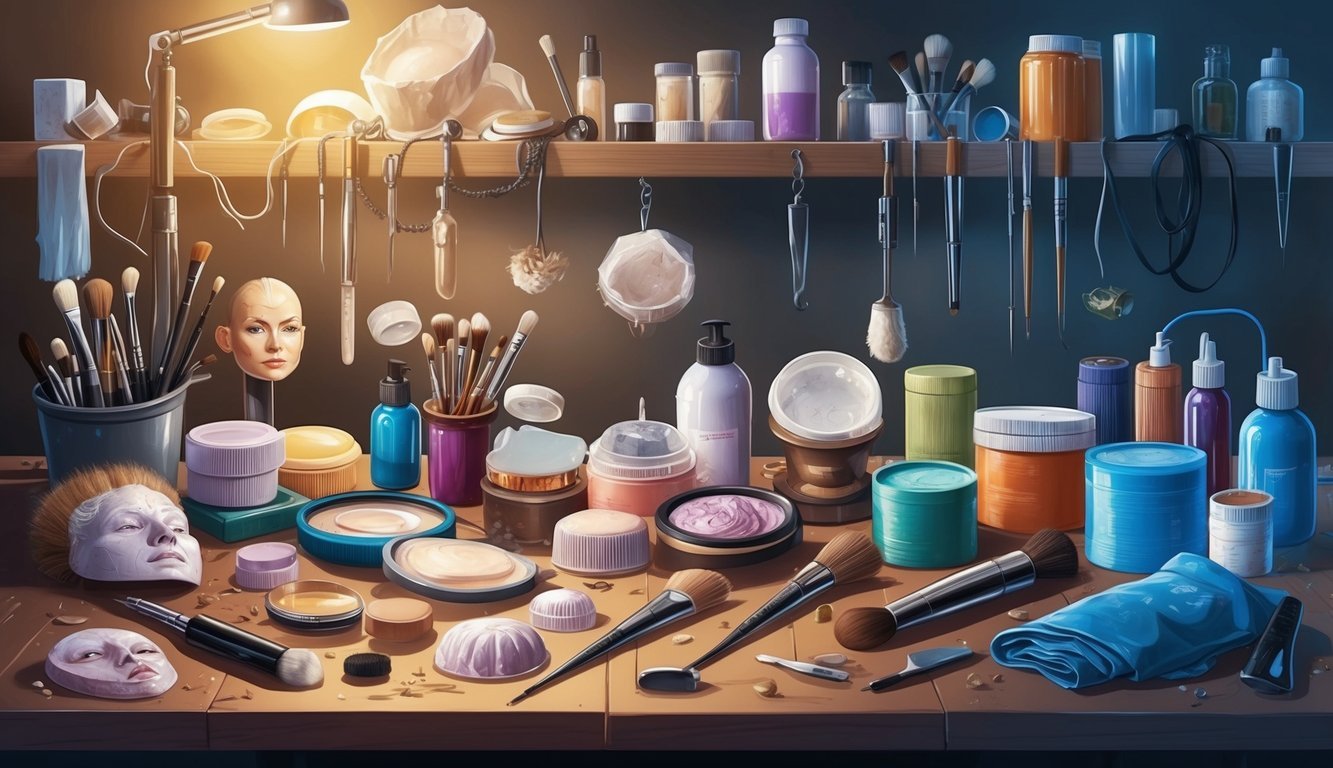
Looking to master the art? Enrolling in a special effects makeup course is the perfect move to learn all the tricks. You’ll dive into using prosthetics, crafting textures, and applying makeup just like they do in films and TV. Let’s explore some fantastic courses that could kickstart your career in this exciting field.
1) Cinema Makeup School – Advanced Lab Techniques

Want to level up your special effects makeup skills? Check out the Advanced Lab Techniques course at Cinema Makeup School.
It’s just what you need!
This course takes what you’ve learned in the basic prosthetics class and cranks it up a notch.
You’ll get hands-on experience with more complex techniques used in the film industry.
Trust me, you’ll feel like a real pro!
You’ll work with the same materials from your previous classes.
Don’t have them? No sweat! You can score a kit from the school or create one yourself.
Learn how to create multi-piece molds and dive into advanced special effects processes, the same techniques used by Hollywood pros.
Think about it—by the course’s end, you could be crafting jaw-dropping special effects that might just grace the silver screen!
2) Gorton Studio – Film & TV Makeup FX
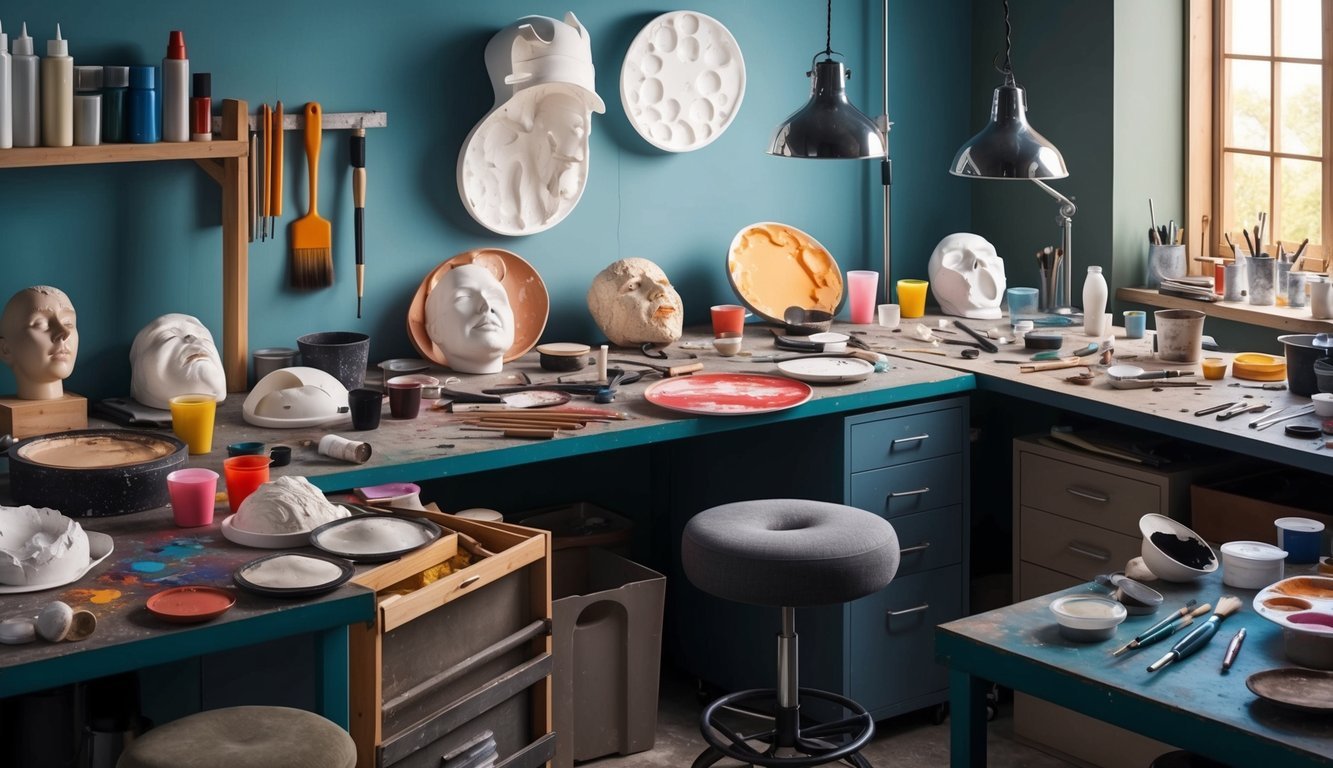
Want to learn from the best? You’ve got to check out Gorton Studio—Europe’s original hub for prosthetics and makeup effects.
This place was launched by Neill Gorton, a multi-award-winning prosthetics designer, back in 2003.
Since then, it’s become the go-to spot for mastering special effects makeup.
With both in-person and online classes, you can choose what fits your schedule best.
Courses cover everything from prosthetics to hybrid techniques that’ll make your portfolio pop.
Gorton Studio isn’t just any old school; it’s truly top-notch in the industry.
You’ll use professional-grade materials and learn from people who really know their stuff.
Got dreams of working in movies or TV? This might just be your ticket to getting there—and who doesn’t want that?
3) Mastered – Prosthetic & Special FX Makeup
Ready to take your skills to the next level? Try Mastered – Prosthetic & Special FX Makeup.
This online course is great for artists at any skill level.
You’ll learn everything from creating basic flat mold appliances to complex multi-piece silicone makeups.
Plus, there’s plenty of content about character masks and display busts.
If you sign up for their monthly subscription, you get access to over 70 lesson videos—with new content added regularly to keep things fresh.
And the best part? You can cancel anytime, which lets you learn at your own pace without feeling trapped.
It’s like having a buffet of knowledge at your fingertips!
No matter if you’re just starting out or already have some experience, you’ll gain the skills needed to create convincing special effects for film, TV, and theater.
Plus, you’ll learn to use top visual effects programs to create stunning animations and lifelike simulations.
Hands-on projects with expert guidance will help you build an impressive portfolio.
By the end of the course, you’ll be ready to bring your creative visions to life.
4) Benny Makeup FX Courses
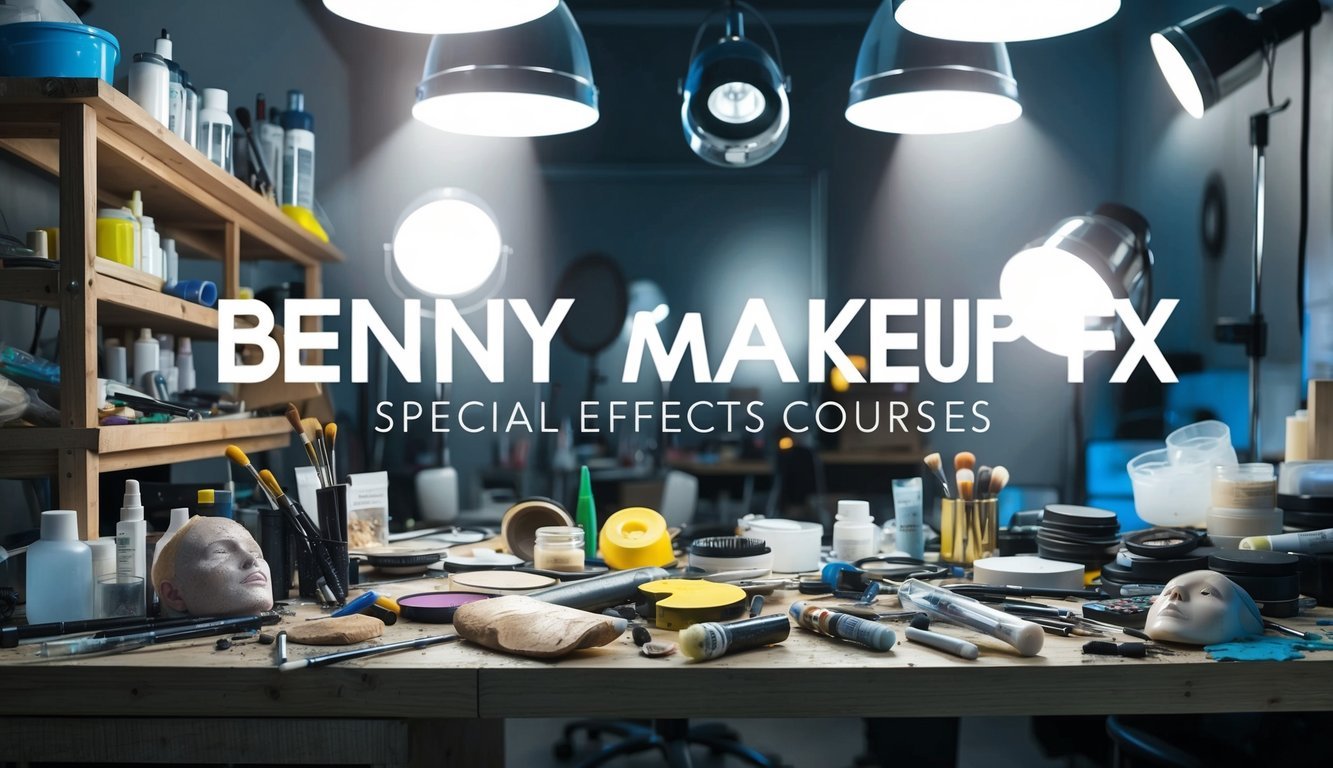
Want to learn special effects makeup from a true pro? Check out Benny Makeup FX Courses.
These classes are perfect for everyone from novices to seasoned artists.
You’ll get hands-on practice with exciting techniques, learning to create wounds, scars, and all sorts of gory effects.
The courses range from the basics to advanced skills—there’s something for everyone!
One of the coolest features? Benny’s classes are flexible, available both online and in-person, fitting perfectly into even the busiest of schedules.
The Character & Special FX Makeup Certificate Program is a fantastic choice, including ten different courses.
Plus, you’ll get to do a professional photo shoot with your makeup creations—how cool is that?
When you wrap up, you’ll have the skills to tackle projects in movies, TV, or theater, along with an awesome portfolio showcasing your new talents.
Understanding Special Effects Makeup
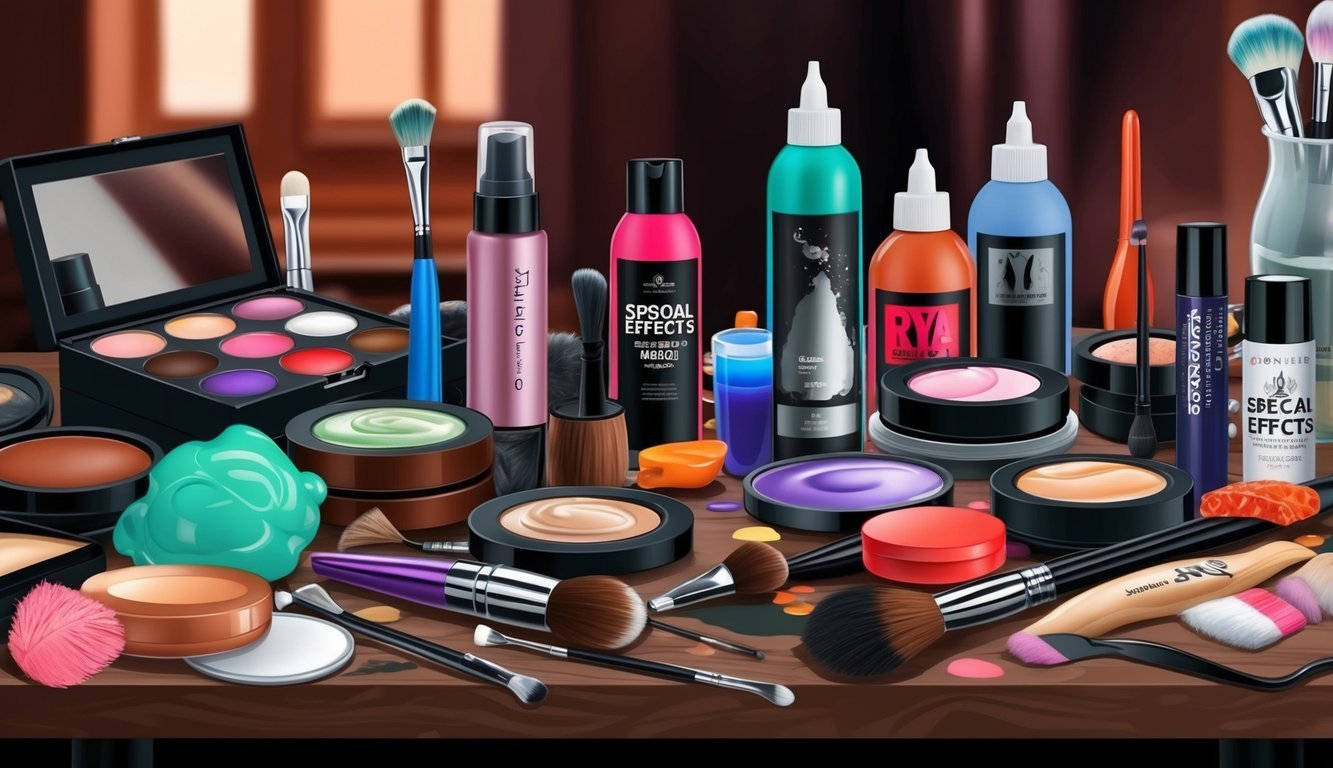
Special effects makeup isn’t just about slapping on some colors; it’s an art form that transforms actors into fantastical creatures, creates startlingly real wounds, and makes characters age believably.
These techniques and materials produce stunning visual effects for film, TV, and theater.
History of Special Effects Makeup
Special effects makeup has a fascinating history.
Picture the 1920s, where Lon Chaney Sr. wowed audiences with his self-applied monster makeups, using cotton, collodion, and greasepaint to become characters like the Phantom of the Opera.
Fast forward to the 1930s, and you’ll see Jack Pierce’s groundbreaking work on Frankenstein’s monster.
The 1940s brought foam latex into the mix, allowing for more lifelike and flexible prosthetics.
Then came the 1970s, with pioneers like Dick Smith, who changed the game with his work on The Exorcist.
He introduced new materials and techniques that are still used today—a true icon in the field!
Basic Techniques and Tools
If you want to dabble in special effects makeup, you’ll need a few essential tools.
Think brushes, sponges, and spatulas.
Adhesives like spirit gum and pros-aide are must-haves for sticking on prosthetics—trust me, they’re game-changers.
Some common techniques include:
- Sculpting and molding prosthetics
- Applying and blending makeup
- Creating fake blood and wounds
- Airbrush techniques
Materials such as silicone, latex, and gelatin are commonly used to craft realistic skin textures.
To learn these skills, courses like the Special FX Makeup Course at QC Makeup Academy can be fantastic starting points.
Practice is the key to nailing these techniques.
Start small with effects like bruises or cuts before diving into more complex prosthetics.
And hey, don’t get discouraged if it doesn’t look perfect right away—I’m no expert, but I’ve seen that practice truly pays off!
Choosing the Right Course
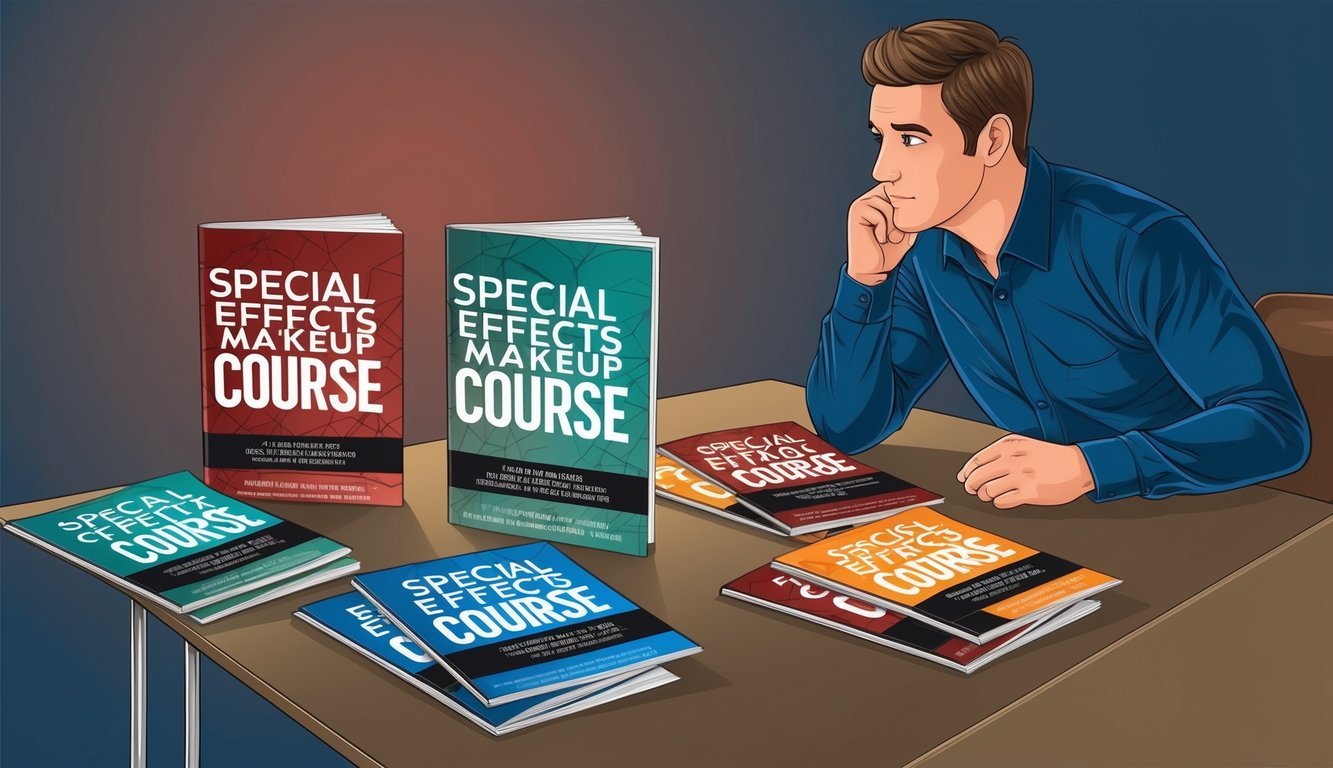
Choosing the right special effects makeup course requires a bit of thought.
It’s all about weighing a few key factors to see if online or in-person learning suits you best.
Factors to Consider
Take a close look at the course content.
Does it cover the skills you want? Check if it teaches essential techniques like character makeup, mold making, and fabricating appliances.
These are crucial skills in the special effects world.
Think about who’s teaching too.
Do they have real Hollywood experience? Schools like Cinema Makeup School in Los Angeles boast top-notch professionals leading their classes.
Cost is another biggie.
Special effects courses can vary widely in price.
Be sure you’re getting bang for your buck! Some schools offer different tracks or shorter programs that might be more budget-friendly.
Don’t overlook job prospects either.
Does the school help with job placements after graduation? Look for programs with solid industry connections that can help you land your first gig.
Online vs In-Person Courses
Online courses offer flexibility—you can learn at your own pace and skip travel costs.
But you might miss out on hands-on practice with peers.
In-person courses let you actually work with materials and get instant feedback.
Plus, you’ll start building a network with classmates and instructors, which can be a huge help in landing jobs later.
Some schools offer a mix of both, allowing you to do theory online and practical work face-to-face.
It’s a great middle ground if you’re keen on both styles.
Think about your learning style.
Do you perform better with structure, or do you like more freedom? In-person classes keep you on a fixed schedule, while online courses let you fit studying around your life.
Lastly, consider your long-term goals.
If you’re eyeing a career in movies, in-person training at a place like L Makeup Institute might be the way to go.
But if you’re just looking to have fun as a hobby, an online course could be everything you need.
Frequently Asked Questions
![A well-organized table filled with tools and products and a computer displaying online course listings, accompanied by a banner reading "Frequently Asked Questions about Special Effects Makeup Courses."></p>
<p>Special effects makeup courses can vary in cost, location, and focus, but there are options for everyone.</p><p>You can find both in-person and online learning opportunities, plus some free resources to get you started.</p>
<h3><span class="ez-toc-section" id="Where_can_I_study_special_effects_makeup"></span>Where can I study special effects makeup?<span class="ez-toc-section-end"></span></h3>
<p>You can study special effects makeup at specialized schools, colleges with makeup programs, or through online courses.</p><p>If you’re looking for hands-on training, <a target="_blank" rel="noopener noreferrer" href="https://www.cinemamakeup.com/special-effects-makeup/">Cinema Makeup School</a> in Los Angeles is an excellent bet.</p><p>Some universities also offer film and theater departments that teach SFX makeup.</p>
<h3><span class="ez-toc-section" id="How_much_does_a_special_effects_makeup_course_typically_cost"></span>How much does a special effects makeup course typically cost?<span class="ez-toc-section-end"></span></h3>
<p>Costs can range from a couple of hundred to several thousand dollars.</p><p>Short workshops might set you back around $500-$1000, while full programs at places like <a target="_blank" rel="noopener noreferrer" href="https://www.gortonstudio.co.uk/">Gorton Studio</a> can easily exceed $10,000.</p><p>Online courses are often cheaper, kicking off around $200-$500.</p>
<h3><span class="ez-toc-section" id="What_are_the_top_online_courses_for_learning_special_effects_makeup"></span>What are the top online courses for learning special effects makeup?<span class="ez-toc-section-end"></span></h3>
<p>You might want to check out <a target="_blank" rel="noopener noreferrer" href="https://www.mastered.com/">Mastered’s Prosthetic & Special FX Makeup</a> program or <a target="_blank" rel="noopener noreferrer" href="https://bennymakeupfx.com/">Benny Makeup FX Courses</a>.</p><p>They deliver fantastic flexible learning options covering a wide range of techniques that let you learn at your own pace—direct from industry pros.</p>
<h3><span class="ez-toc-section" id="Which_makeup_certification_is_considered_the_best_in_the_industry"></span>Which makeup certification is considered the best in the industry?<span class="ez-toc-section-end"></span></h3>
<p>While there’s no single “best” certification, diplomas from renowned schools are highly respected.</p><p>Finishing programs at places like Cinema Makeup School or Gorton Studio can significantly boost your credibility.</p><p>Some artists also opt for certifications in specific techniques or products to stand out even more.</p>
<h3><span class="ez-toc-section" id="What_methods_are_there_for_learning_special_effects_makeup_for_free"></span>What methods are there for learning special effects makeup for free?<span class="ez-toc-section-end"></span></h3>
<p>Free learning opportunities abound! Dive into YouTube tutorials, explore makeup artist blogs, and engage with social media.</p><p>Many pros are happy to share tips and tricks online.</p><p>Get your hands dirty by practicing on yourself with basic supplies, and don’t hesitate to join online SFX makeup communities to gain feedback and support!</p>
<h3><span class="ez-toc-section" id="How_do_I_choose_the_best_special_effects_makeup_school_for_my_needs"></span>How do I choose the best special effects makeup school for my needs?<span class="ez-toc-section-end"></span></h3>
<p>When it comes to picking the right special effects makeup school, think about what you want to achieve and how much you can spend.</p><p>Check the course curriculum, get a feel for the instructor’s experience, and look at job placement rates.</p>
<p>Make sure the school offers hands-on practice and has solid industry connections.</p><p>And definitely read reviews from past students to get the inside scoop on the program quality.</p>
</div>
</article>
<aside class="ct-hidden-sm ct-hidden-md" data-type="type-1" id="sidebar" itemtype="https://schema.org/WPSideBar" itemscope="itemscope"><div class="ct-sidebar"><div class="ct-widget is-layout-flow widget_search" id="search-2">
<form role="search" method="get" class="ct-search-form" data-form-controls="inside" data-taxonomy-filter="false" data-submit-button="icon" action="https://edusref.org/" aria-haspopup="listbox" data-live-results="thumbs">
<input
type="search" placeholder="Search"
value=""
name="s"
autocomplete="off"
title="Search for..."
aria-label="Search for..."
>
<div class="ct-search-form-controls">
<button type="submit" class="wp-element-button" data-button="inside:icon" aria-label="Search button">
<svg class="ct-icon ct-search-button-content" aria-hidden="true" width="15" height="15" viewBox="0 0 15 15"><path d="M14.8,13.7L12,11c0.9-1.2,1.5-2.6,1.5-4.2c0-3.7-3-6.8-6.8-6.8S0,3,0,6.8s3,6.8,6.8,6.8c1.6,0,3.1-0.6,4.2-1.5l2.8,2.8c0.1,0.1,0.3,0.2,0.5,0.2s0.4-0.1,0.5-0.2C15.1,14.5,15.1,14,14.8,13.7z M1.5,6.8c0-2.9,2.4-5.2,5.2-5.2S12,3.9,12,6.8S9.6,12,6.8,12S1.5,9.6,1.5,6.8z"/></svg>
<span class="ct-ajax-loader">
<svg viewBox="0 0 24 24">
<circle cx="12" cy="12" r="10" opacity="0.2" fill="none" stroke="currentColor" stroke-miterlimit="10" stroke-width="2"/>
<path d="m12,2c5.52,0,10,4.48,10,10" fill="none" stroke="currentColor" stroke-linecap="round" stroke-miterlimit="10" stroke-width="2">
<animateTransform
attributeName="transform"
attributeType="XML"
type="rotate"
dur="0.6s"
from="0 12 12"
to="360 12 12"
repeatCount="indefinite"
/>
</path>
</svg>
</span>
</button>
</div>
<div class="screen-reader-text" aria-live="polite" role="status">
No results </div>
</form>
</div><div class="ct-widget is-layout-flow widget_simsim_posts_widget" id="simsim_posts_widget-3"><h3 class="widget-title">Related Posts</h3><div class="related-posts-widget"><div class="related-post-item"><a href="https://edusref.org/7-best-professional-etiquette-courses/" class="related-post-thumb"><img width="300" height="173" src="https://edusref.org/wp-content/uploads/2024/11/v2-l464s-2r92j-1-300x173.jpg" class="attachment-medium size-medium wp-post-image" alt="Conference room with tables, chairs, and documents on each surface" decoding="async" srcset="https://edusref.org/wp-content/uploads/2024/11/v2-l464s-2r92j-1-300x173.jpg 300w, https://edusref.org/wp-content/uploads/2024/11/v2-l464s-2r92j-1-1024x590.jpg 1024w, https://edusref.org/wp-content/uploads/2024/11/v2-l464s-2r92j-1-768x442.jpg 768w, https://edusref.org/wp-content/uploads/2024/11/v2-l464s-2r92j-1.jpg 1333w" sizes="(max-width: 300px) 100vw, 300px" /></a><h4 class="related-post-title"><a href="https://edusref.org/7-best-professional-etiquette-courses/">7 Best Professional Etiquette Courses to Boost Your Career Game</a></h4></div><div class="related-post-item"><a href="https://edusref.org/how-to-sign-up-for-nursing-school/" class="related-post-thumb"><img width="300" height="173" src="https://edusref.org/wp-content/uploads/2024/11/v2-l4un7-mzt3h-1-300x173.jpg" class="attachment-medium size-medium wp-post-image" alt="Person filling out an application form on a desk with a computer" decoding="async" srcset="https://edusref.org/wp-content/uploads/2024/11/v2-l4un7-mzt3h-1-300x173.jpg 300w, https://edusref.org/wp-content/uploads/2024/11/v2-l4un7-mzt3h-1-1024x590.jpg 1024w, https://edusref.org/wp-content/uploads/2024/11/v2-l4un7-mzt3h-1-768x442.jpg 768w, https://edusref.org/wp-content/uploads/2024/11/v2-l4un7-mzt3h-1.jpg 1333w" sizes="(max-width: 300px) 100vw, 300px" /></a><h4 class="related-post-title"><a href="https://edusref.org/how-to-sign-up-for-nursing-school/">How to Sign Up for Nursing School: Quick Steps to Get Started</a></h4></div><div class="related-post-item"><a href="https://edusref.org/7-top-automotive-diagnostic-courses/" class="related-post-thumb"><img width="300" height="173" src="https://edusref.org/wp-content/uploads/2024/11/v2-l4aqq-25yp8-1-300x173.jpg" class="attachment-medium size-medium wp-post-image" alt="Open toolbox with tools and car parts on a workbench in a garage" decoding="async" srcset="https://edusref.org/wp-content/uploads/2024/11/v2-l4aqq-25yp8-1-300x173.jpg 300w, https://edusref.org/wp-content/uploads/2024/11/v2-l4aqq-25yp8-1-1024x590.jpg 1024w, https://edusref.org/wp-content/uploads/2024/11/v2-l4aqq-25yp8-1-768x442.jpg 768w, https://edusref.org/wp-content/uploads/2024/11/v2-l4aqq-25yp8-1.jpg 1333w" sizes="(max-width: 300px) 100vw, 300px" /></a><h4 class="related-post-title"><a href="https://edusref.org/7-top-automotive-diagnostic-courses/">7 Top Automotive Diagnostic Courses You Need to Take ASAP</a></h4></div><div class="related-post-item"><a href="https://edusref.org/how-to-sign-up-for-traffic-school/" class="related-post-thumb"><img width="300" height="173" src="https://edusref.org/wp-content/uploads/2024/11/v2-l4uxu-ghfvr-1-300x173.jpg" class="attachment-medium size-medium wp-post-image" alt="Man taking online traffic school course on a computer. Stop signs and cone" decoding="async" loading="lazy" srcset="https://edusref.org/wp-content/uploads/2024/11/v2-l4uxu-ghfvr-1-300x173.jpg 300w, https://edusref.org/wp-content/uploads/2024/11/v2-l4uxu-ghfvr-1-1024x590.jpg 1024w, https://edusref.org/wp-content/uploads/2024/11/v2-l4uxu-ghfvr-1-768x442.jpg 768w, https://edusref.org/wp-content/uploads/2024/11/v2-l4uxu-ghfvr-1.jpg 1333w" sizes="auto, (max-width: 300px) 100vw, 300px" /></a><h4 class="related-post-title"><a href="https://edusref.org/how-to-sign-up-for-traffic-school/">How to Sign Up for Traffic School: Quick and Easy Steps</a></h4></div></div></div></div></aside>
</div>
</main>
<footer id="footer" class="ct-footer" data-id="type-1" itemscope="" itemtype="https://schema.org/WPFooter"><div data-row="bottom"><div class="ct-container" data-columns-divider="md:sm"><div data-column="copyright">
<div
class="ct-footer-copyright"
data-id="copyright">
<p>Copyright © 2026 - EdusRef</p></div>
</div><div data-column="ghost"></div></div></div></footer></div>
<script type="speculationrules">
{"prefetch":[{"source":"document","where":{"and":[{"href_matches":"/*"},{"not":{"href_matches":["/wp-*.php","/wp-admin/*","/wp-content/uploads/*","/wp-content/*","/wp-content/plugins/*","/wp-content/themes/blocksy/*","/*\\?(.+)"]}},{"not":{"selector_matches":"a[rel~=\"nofollow\"]"}},{"not":{"selector_matches":".no-prefetch, .no-prefetch a"}}]},"eagerness":"conservative"}]}
</script>
<div id="grow-wp-data" data-grow=](https://edusref.org/wp-content/uploads/2024/11/v2-l4b8f-nv291.jpg)

